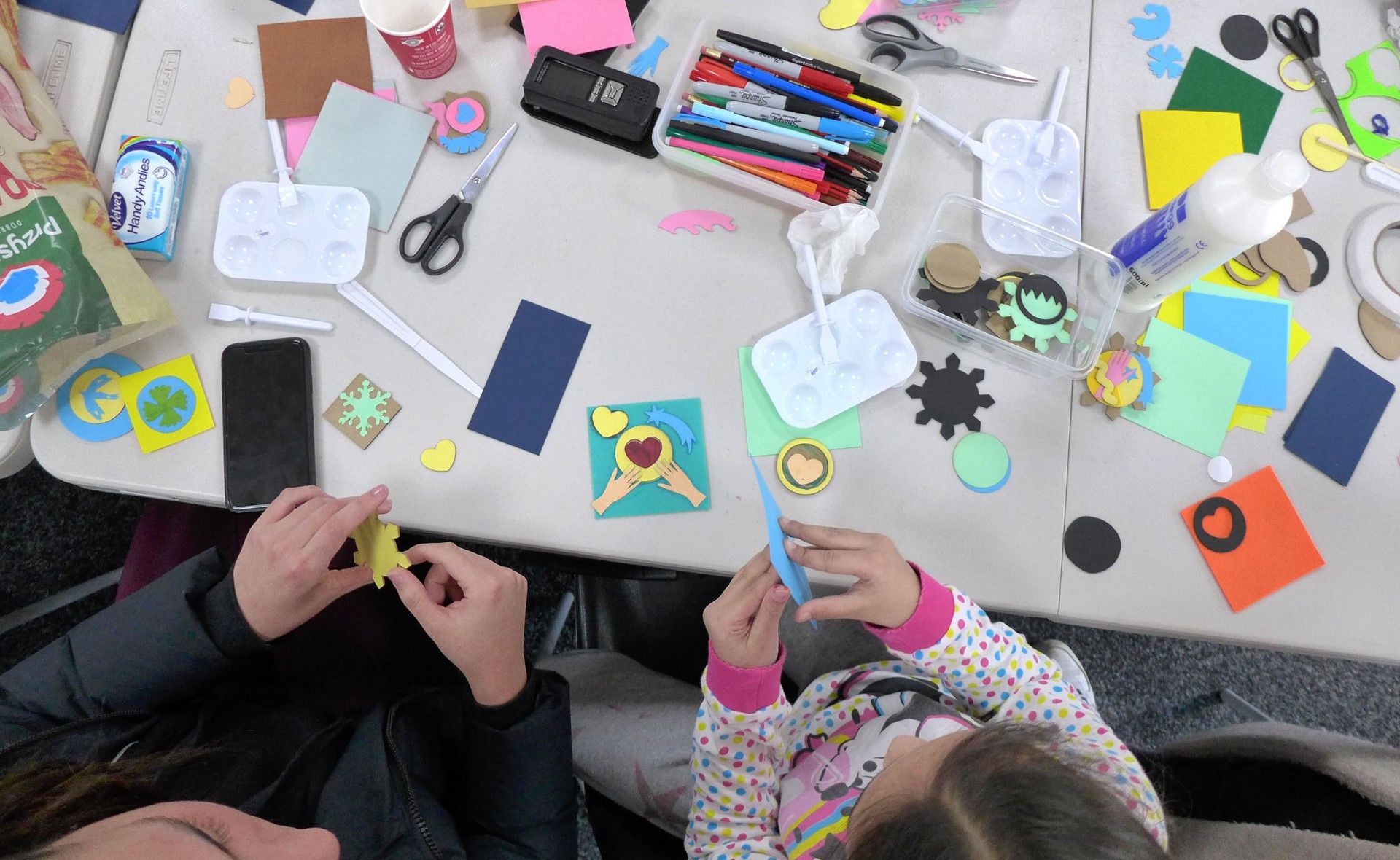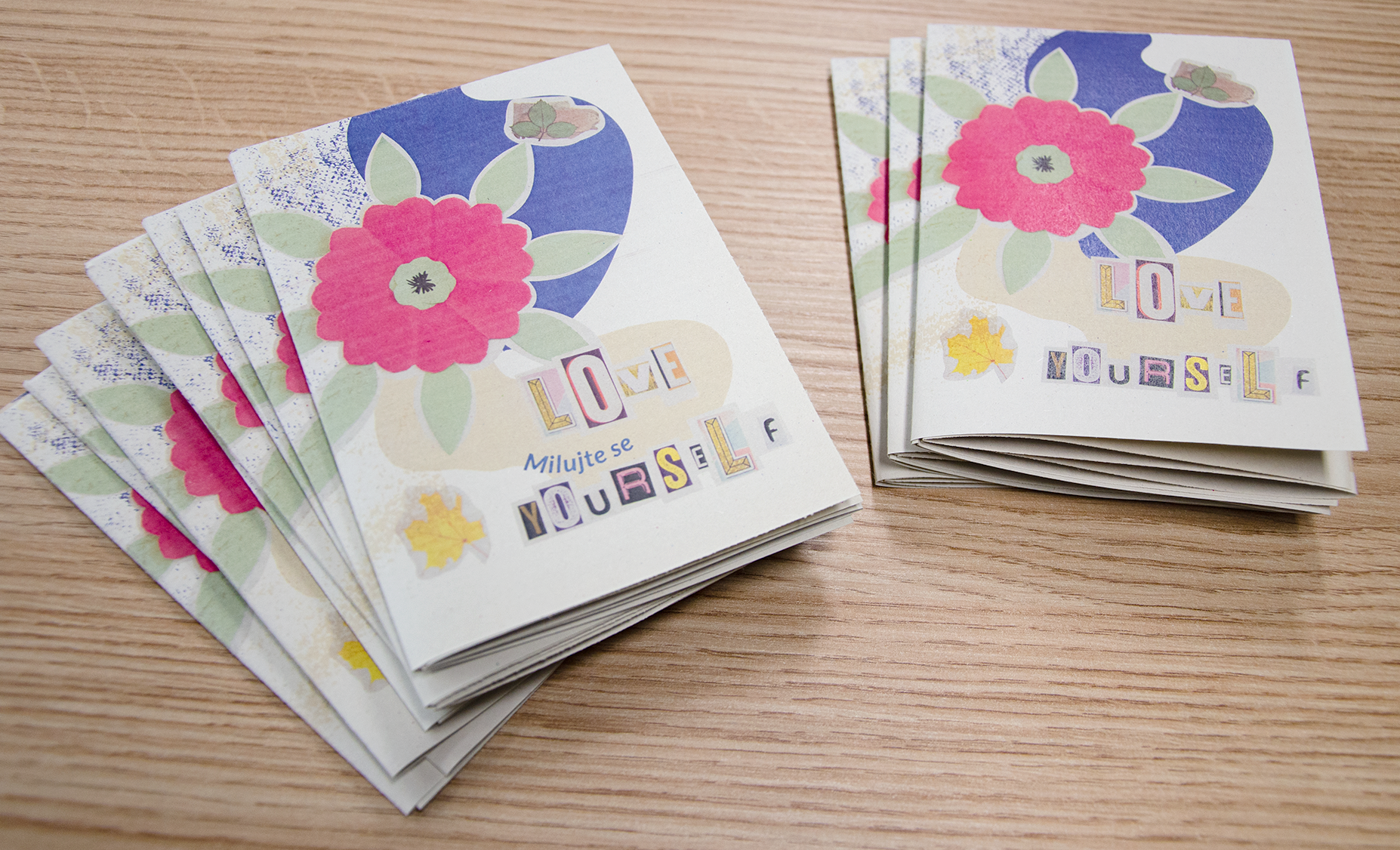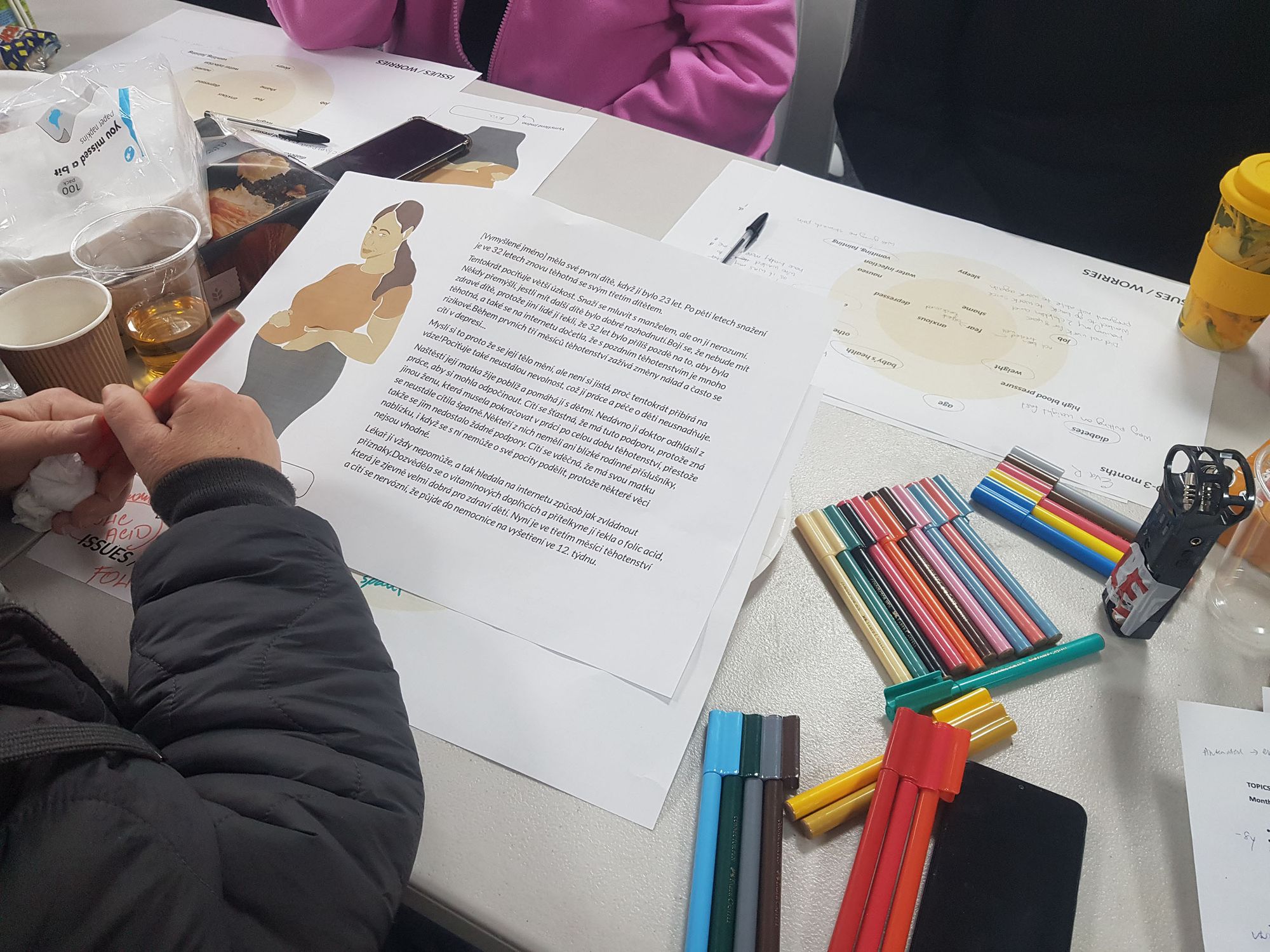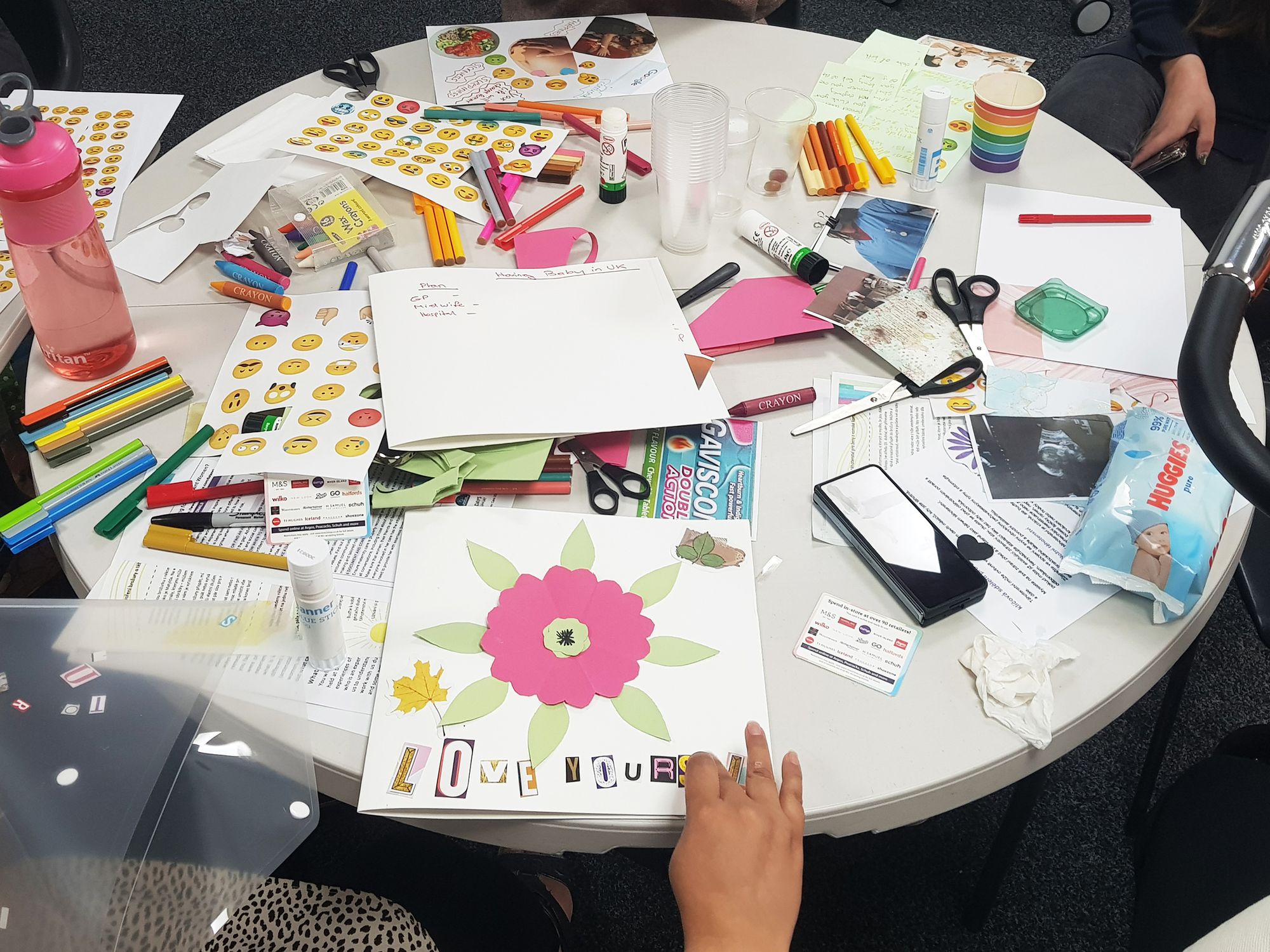Join a Webinar about this project on 18 Sept with researchers and Czech-Slovak Roma women sharing their stories about the experience of participatory research.
How did the ERicar project start?
ERicar is an interdisciplinary project that combined participatory design-led inquiry together with applied health research using qualitative methods. It was funded by the Medical Research Council’s (MRC) Public Health Intervention Development Grant (PHIND). One of its aims is to support early-stage development of health solutions, particularly those that address public health challenges through co-production with the public.

The idea for the project was informed by Mabel Lie’s long-term interest in race equality in the healthcare context, in particular reproductive health, and participatory methods. This was further developed with the involvement of Caro Claisse (Innovation Fellow at Open Lab) and Zaneta Karchnakova (Roma community facilitator and peer researcher). Lie, Claisse and Karchnakova brainstormed potential collaboration, which led to the delivery of two co-creation sessions funded by Newcastle University Pioneer Awards.
These sessions enabled us to build rapport with a group of Roma women whilst learning about their migration stories to the UK. Insights from this engagement informed the more substantive MRC-funded ERicar project to explore women’s experiences of healthcare services for pregnancy and childbirth, and to use co-creation as a way of generating understandings of their needs and preferences for service design and information resources.
Throughout the project, we were supported by our expert advisory panel, which consisted of academics with expertise ranging from Design, Public Health, Geography and Critical Race Theory, as well as stakeholders from Statutory and Voluntary sectors.
Why did you focus on Czech-Slovak Roma women?
The Roma are the largest ethnic minority community in Europe and Roma women from Central and Eastern Europe suffer discrimination of different forms in their home countries which influence their engagement with public services in the UK. Further, like other migrant women, they are often unaccustomed to the way health services work in the UK.
Language and cultural barriers, racial bias and discrimination also exist, leading to hesitancy in accessing pregnancy support services. As a result, these experiences of pregnancy and childbirth lead to inequalities in their maternal and perinatal outcomes. Work with Czech-Slovak Roma followed previous engagement with this community at Newcastle University’s School of Education, Communication and Language Sciences.
Why did you decide on co-creating an information resource with the women rather than using other methods?
We decided to follow recommendations for a person- and community-centred participatory research approach which has been able to harness the potential of migrant communities. Claisse has previous experience in this area working in community and sensitive settings, and ERicar was an opportunity for her to build on previous work, which demonstrated the value of co-creation for supporting the sharing of lived experience.

We began by co-envisioning a resource to support women in the community. We discussed ideas with the group and the women settled on creating a booklet about pregnancy in the UK to share with other women in their community. Everyone was able to contribute to the resource in their own ways:
"I really like that you capture a little bit of everybody’s work, you know? It’s just brilliant and then just put it in that booklet, you can see you know, it’s a little bit of my work, a little bit of her work…" - Woman participant and community facilitator.
"Everything we create, she captured a bit of, she captured everyone’s work" - Woman participant 01
And why did you want to focus on antenatal care?
A review into Eastern European migrants’ use and experience of UK healthcare identified the lack of intervention studies and none on the topic of antenatal care, which covers the start of the first 1000 days of life (UNICEF). This is a unique period when the foundations for health and growth for the rest of an individual’s life are established.
The workshops gave us the opportunity to hear from the women their perspectives on their antenatal care and improvements they would like to see.
"It was more of our opinion, our stories, what we want to change in the future and the impact that this project will leave behind." - Woman participant and interpreter
One of our participants who had three pregnancies in the UK reflected on how thought provoking it was to take part in the workshops:
"Just remembering what was good, what was bad about it [pregnancy]… And it just made me realised some things that probably weren’t right during my pregnancy. And not realising it then. But then one we got back to it and talking about it, maybe I would have done things differently." - Woman participant 02
Had they ever worked with researchers before? What was the experience like for them?
We worked closely with Zaneta who is an experienced community worker who has worked with one of our academic advisers on a novel language research project involving the Czech-Slovak community. (ROMtels; Newcastle University (ncl.ac.uk).
She drew on her networks to recruit a group of 12 Czech-Slovak mothers from a range of ages and backgrounds. Our Czech interpreter was Irma Karchnakova who worked hard at each session to support with engagement and translation, making sure the voices of the women were accurately represented.
We held a debriefing session at the end of the project and asked the women to reflect on their experience. Overall, the women enjoyed the sessions and felt they could contribute without the fear of being judged.
"I found out that there is a lot of things out there at the moment. I learned a lot from it [workshop]. I felt very comfortable and open because I never talked about it and I felt I could share this information for the first time, and I felt confident and happy in the room to share this information." - Woman participant 03
How did you begin to gather their stories?
One of the advantages of the project was to work with an established group of women led by a trusted community facilitator. Over a period of fifteen weeks, we met almost weekly in a community space (Integration Station) that supports refugee and migrant communities living in the North East of England. Breakfast was provided at each session and together, we managed to create a safe environment, which was comfortable and inclusive (i.e. children and baby friendly).
Before capturing the stories, we started by collectively establishing ‘ground rules’ so the women knew that they would not be judged for what they have to say. Our conversations were facilitated by Lie and Claisse, supported by the peer researcher and interpreter who helped address any potentially distressing and sensitive matters.
How did the stories and women’s views feed into the antenatal care information resource?
The process of co-creation was scaffolded by design-based methods. For example, we used a character-driven scenario to channel women’s contributions and consider the experience of a young pregnant woman who was new to the country, unsure and anxious.
We created the character of Matylda as an illustrative and narrative prompt. The women became acquainted with the character, which evolved throughout our sessions and acted as a means for synthesising important themes whilst generating more conversation and reflection.

In the workshops, the women shared about mental health, which they described as an important aspect of their pregnancy journey. They later decided to focus the resource on addressing mental health issues by sharing encouraging messages and information for women in their community.
And yes about the mental health, I just wanted to raise, I was very surprised with this project that everybody opened up about their mental health. It was not taboo, which in our community it’s a big taboo. But everybody was so supportive of each other […] And every women, different ages in the group we have said it’s important to talk about mental health. - Woman participant and interpreter
How does the co-created antenatal care information resource work?
It serves as a tangible, portable, conveniently sized item to be carried around and shared, and referred to in time of need. It will also be available digitally, so that useful websites can be accessed easily. It is an attractive way to reach seldom-heard groups who tend not to access public health information and support, but to depend on family relations, cultural norms, and internet searches.
As it has been created as a community resource by members of the community, this would encourage better engagement with health service provision, breaking down some of the barriers that may exist for a variety of reasons. The information (links to websites) provided in the zine could be updated, but the messages from the women have longevity.

What do you hope people will get out of joining the webinar in July?
We hope that people will be encouraged to engage with marginalised communities by adopting some of the approaches used in this study, e.g., meeting them in their community spaces; building trust and ownership of the project, and taking advantage of co-creation as a method of participants being able to express themselves and what they feel is most important for them and their community.
These could lead to more attention paid to the ways care is provided to this group. More importantly, the possibility of a creative output of this sort has scalability and potential to be used as a bridge to healthcare provision for newly arrived migrants.
Join the Webinar about this project on 18 Sept with researchers and Czech-Slovak Roma women sharing their stories about the experience.